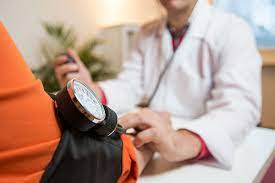Hypertension – Causes, Symptoms, and Physiotherapy Management | Physio360 Chennai.
- PHYSIO 360

- Sep 23
- 2 min read

INTRODUCTION;
Hypertension, commonly known as high blood pressure, is one of the leading health concerns worldwide. Often called the “silent killer”, hypertension can go unnoticed for years while causing significant damage to vital organs like the heart, brain, kidneys, and eyes. At Physio360 Chennai, we emphasise the importance of early detection, lifestyle modification, and physiotherapy-based interventions for long-term management of hypertension.
What is Hypertension?
Hypertension occurs when the force of blood against the arterial walls remains consistently high. Normal blood pressure is around 120/80 mmHg. A reading above 140/90 mmHg is generally considered hypertensive.
Causes of Hypertension.
Several factors contribute to high blood pressure, including:
Genetics – family history of hypertension.
Lifestyle factors – sedentary lifestyle, lack of physical activity, smoking, and alcohol intake.
Dietary habits – excess salt, processed foods, and high-fat diets.
Obesity & overweight – added strain on the cardiovascular system.
Stress – chronic stress elevates blood pressure.
Medical conditions – diabetes, kidney disease, and hormonal imbalances.

Symptoms of Hypertension
Hypertension is often asymptomatic but may present with:
Headaches (especially in the morning)
Dizziness
Shortness of breath
Palpitations
Blurred vision
Nosebleeds in severe cases
If you experience any of these symptoms, it’s crucial to consult a healthcare professional.
Complications of Untreated Hypertension.
If left unmanaged, hypertension can lead to:
Stroke
Heart attack
Kidney damage
Retinopathy (eye damage)
Aneurysm
Physiotherapy and Lifestyle Management at Physio360.
At Physio360 Centre in Chennai, we combine exercise therapy, manual therapy, and lifestyle guidance to help patients manage hypertension naturally.
1. Exercise Prescription
Aerobic Exercises – brisk walking, cycling, swimming, or treadmill sessions to improve heart health.
Strength Training – light to moderate resistance training to control blood pressure.
Breathing Exercises – diaphragmatic breathing, pranayama, and relaxation exercises to reduce stress.
Flexibility Training – yoga and stretching to improve circulation.
2. Weight Management
Our physiotherapists at Physio360 Chennai design customised weight reduction programs that help reduce cardiovascular risk.
3. Stress Management
Relaxation therapy, mindfulness, and guided breathing sessions at Physio360 promote mental wellness and lower stress-induced hypertension.
4. Patient Education
We educate patients on dietary habits, sleep hygiene, and home exercise programs for long-term control.
Benefits of Physiotherapy for Hypertension
✔ Improves blood circulation
✔ Reduces stress and anxiety
✔ Enhances cardiovascular efficiency
✔ Promotes weight loss
✔ Prevents secondary complications
✔ Improves quality of life

Why Choose Physio360 for Hypertension Management?
Experienced physiotherapists in Chennai
Evidence-based treatment approaches
Personalised exercise programs tailored to each patient
Holistic care focuses on both physical and mental well-being
Convenient locations near you in Chennai with extended hours
Conclusion
Hypertension may be silent, but its impact on health is serious. The good news is that with proper guidance, lifestyle modification, and physiotherapy support, hypertension can be effectively controlled. At Physio360 Chennai, we ensure that every patient receives the best physiotherapy care for hypertension and related lifestyle conditions.
Take a step towards a healthier heart today with Physio360 – your trusted physiotherapy clinic in Chennai.
REFERENCE AND RESEARCH ARTICLE ;
1.Hypertension Management: An Updatehttps://pmc.ncbi.nlm.nih.gov/articles/PMC4106550/.
2.Hypertension: pathophysiology and treatmenthttps://doi.org/10.1093/bjaceaccp/mkh020




Comments